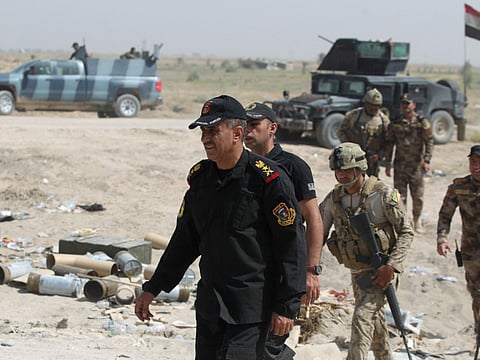To defeat Daesh, Iraq must win back hearts and minds
Until Sunni Arab communities can trust the Shiite-dominated government in Baghdad, there is little hope of permanently uprooting Daesh

Iraq is embroiled in a major battle against Daesh (the self-proclaimed Islamic State of Iraq and the Levant) as it attempts to retake Fallujah, the second largest city under Daesh control, which has been a bastion of militant and insurgent groups for more than a decade. The operation follows the group’s loss of Ramadi and a series of other strategically important towns and cities. Since May 2015, Daesh has been unable to launch a single successful operation.
The battle for Falluja will almost certainly bring the city back under the control of the government, but at what cost and towards what end? Fallujah is a symbol of resistance against occupation for many sections of Iraqi society, particularly among the Sunni Arab population. Even the United States, with its powerful armed forces, equipment and intelligence capabilities, struggled to control the city and, in the end, managed only to contain rather than actually eliminate insurgency and other militant groups during its occupation.
Fallujah is the birthplace of Daesh. Unknown to many, Fallujah fell under terrorist control in January 2014 after months of violent protests and conflict, long before Daesh (a rebranded version of Al Qaida in Iraq) became as known to the world as it is today. Retaking Fallujah will deliver a psychological blow to Daesh, given the city’s symbolic importance. It will also generate great momentum for the broader military campaign and effort to liberate Mosul, Daesh’s principal stronghold in Iraq, where it declared the establishment of its “Caliphate” in June 2014. But it remains unclear how much Daesh and its fighters, who are heavily assimilated into the local population and have significant local support, will invest in any counter-offensive in Fallujah. It may opt for the same guerrilla-style tactics, improvised explosive devices and booby-traps that enabled the city to resist any outside control — rendering meaningless any Iraqi government declaration of victory in the coming period. Retaking Fallujah will most likely mean the start of the war after the war.
Defeating Daesh requires basic services, institutions, good governance and the reconciliation of divided communities.
It is not so much an issue of when and how Fallujah will be liberated but, rather, who will be doing the liberating. The operation and the campaign to defeat Daesh more generally is one part military and one part political. The local Sunni Arab population in places such as Fallujah do not trust the Shiite-dominated Baghdad government, which has done little to allay concerns about its authoritarianism (particularly during the former prime minister Nouri Al Maliki’s tenure) and sectarian bias. The role of Shiite militia groups also exacerbates tensions, since they are accused of committing sectarian atrocities against Sunni Arabs and because of their large numbers, financial and military resources and autonomy from the state. They are reported to be playing a limited role in Fallujah — though the realities on the ground, and the perception of the militias, tend to be different.
Defeating Daesh requires basic services, institutions, good governance and the reconciliation of divided communities. That means winning the hearts and minds of Sunni Arabs and addressing their deep-rooted grievances (many see Daesh as being the least worst option in comparison to a government they feel has marginalised and neglected them), while also fighting Daesh on the military front.
However, it is unlikely Iraq’s increasingly fragile government and its dysfunctional, corrupt and sectarian political establishment is up to the task of doing so. Sectarian tensions, dysfunctional governance and regional polarisation have worsened since Daesh came onto the scene — factors that precipitated the group’s rise in the first place. It is almost certain that the “Caliphate” and Daesh-governed territories will meet their end during the course of this messy war, but that does not necessarily mean the end of Daesh, which retains its capacity to commit terrorist atrocities throughout the country.
— Guardian News & Media Ltd
Dr Ranj Alaaldin is a Middle East scholar at the London School of Economics and Political Science. He is currently working on the war on Daesh, with a particular emphasis on post-conflict reconstruction, sectarianism, Shiite militias and the Kurdish Peshmerga forces. He is an Associate Fellow at the International Centre for the Study of Radicalisation (ICSR), King’s College London and a Visiting Scholar at Columbia University.
Sign up for the Daily Briefing
Get the latest news and updates straight to your inbox



